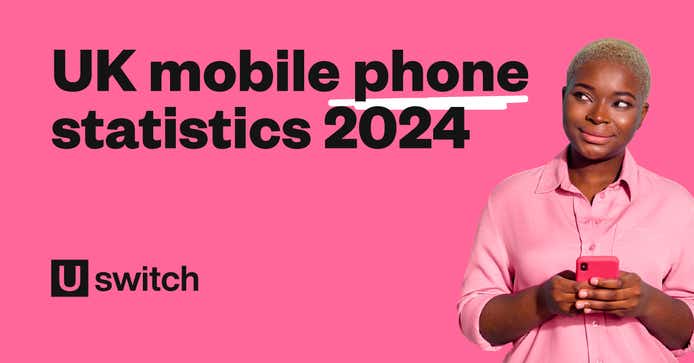Since 2019, there have been 12,980 reports of mobile phone scams made to Action Fraud, the UK’s national reporting centre for fraud and cybercrime.
Mobile scams can include missed calls, imposters, recorded messages, text messages, fake deliveries, confidence tricksters and phone insurance scams. Mobile fraud criminals sometimes pose as legitimate companies offering money off your monthly phone contract and SIM only deals, or promoting mobile phone deals that seem too good to be true. It is essential to verify the source of any text messages or links sent to your mobile phone to avoid falling victim to these scams.
Our experts wanted to reveal the state of mobile phone scams in the UK, looking at the most-targeted age groups and locations across the nation.
Mobile phone scams in the UK
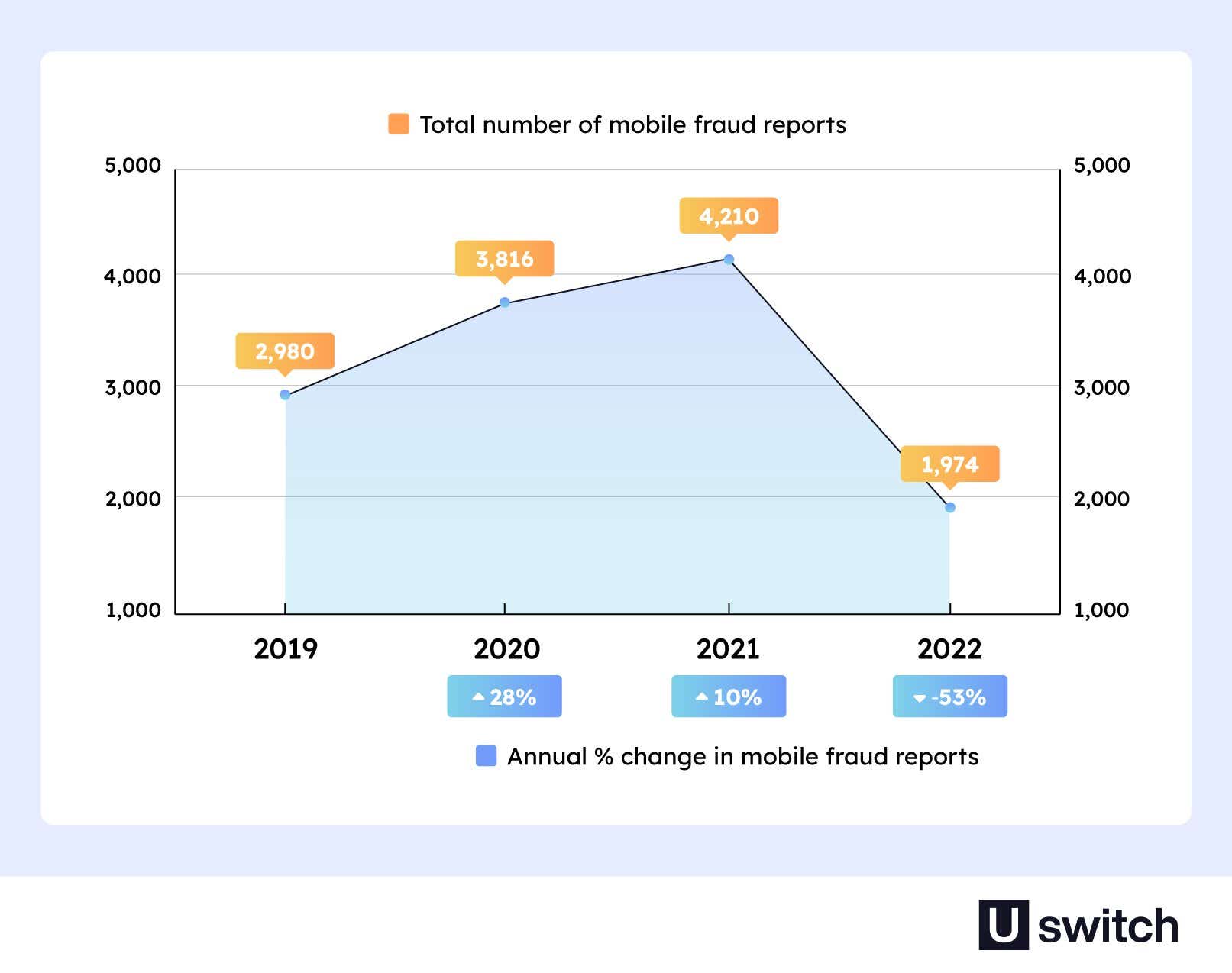
Mobile fraud occurs when a victim suffers personal or financial losses through a phone scam. Phishing is one of the most common forms of mobile fraud. Scammers use imposter email addresses to trick you into sending them personal information or installing malware. Additional types of mobile fraud include, smishing, which sees fraudsters use text messages and vishing, which takes place over phone calls.
Action Fraud is the UK’s main reporting centre for cybercrime, including consumer phone fraud. Action Fraud data reveals that during 2022, there was a drop in the number of reports regarding mobile fraud. The total number of reports fell by 53% when compared to the previous year.
The year 2021 saw the largest number of reports of phone scams - Action Fraud received 4,210 reports of mobile phone scams during the year.
The majority of reports were made from January to July, totalling 3,285. From August to December there was a fall in reports to 2,263. With the UK lockdown lifted around July 2021, it is likely mobile fraud scammers used lockdown restrictions, which prevented people from meeting in person to target victims.
How mobile phone scams affect different age groups
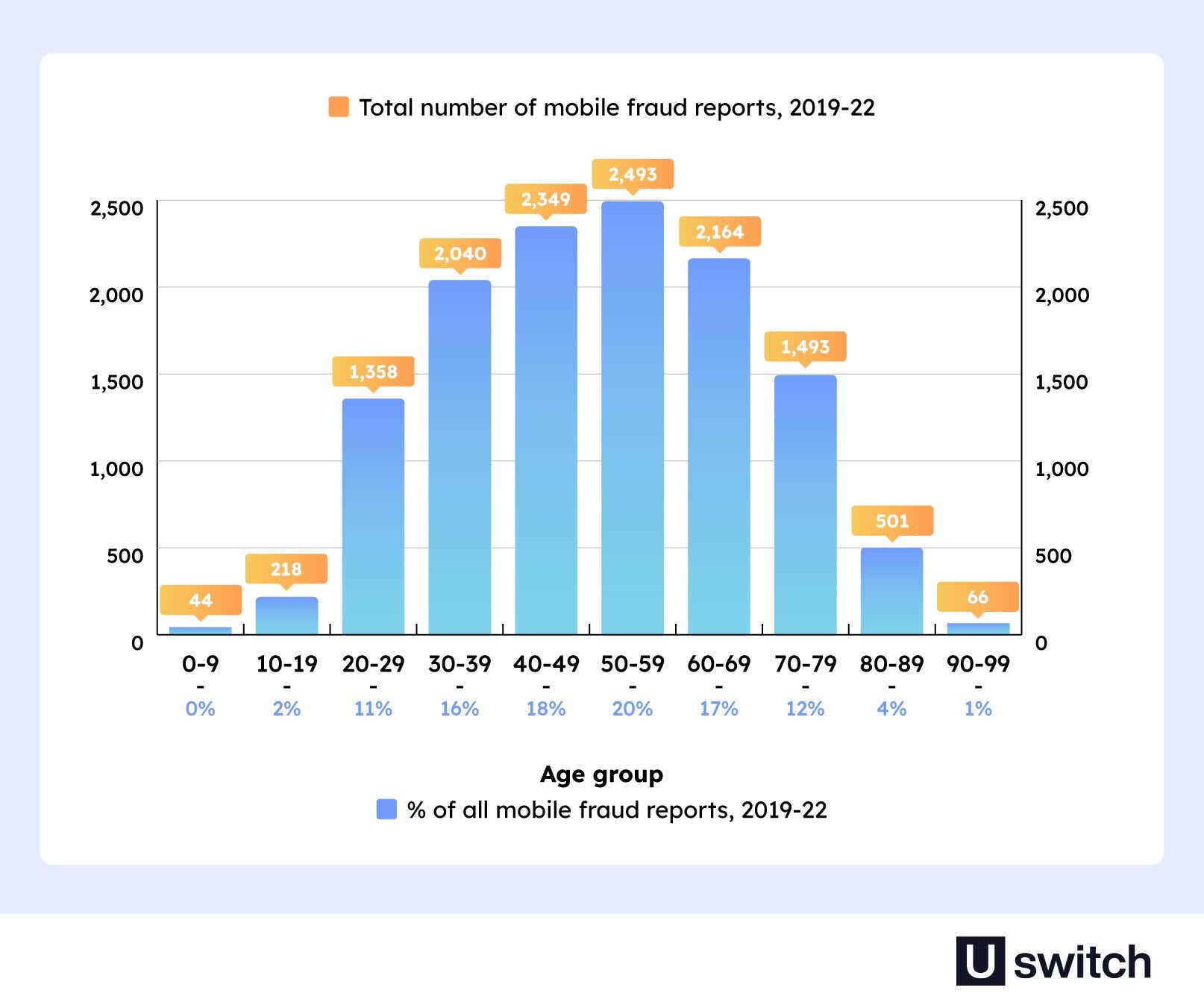
1. Ages 50 - 59 | 2,493 reports of mobile fraud
While many think that older age groups are the main target of mobile fraud scammers, the most affected group in the UK is those aged 50-59.
While this demographic makes up 14% of the total UK population, it made up 20% of all mobile fraud reports between 2019 and 2022. In total, there were 2,493 reports made by those aged 50-59 to Action Fraud regarding consumer phone fraud.
2. Ages 40 - 49 | 2,349 reports of mobile fraud
Ages 40-49 are among the second most affected age group by mobile fraud scammers. This age group made up 18% of all reports of consumer phone fraud between 2019 and 2022.
There were 2,349 cases of mobile fraud reported to Action Fraud by those aged 40-49 in the last three years.
3. Ages 60 - 69 | 2,164 reports of mobile fraud
There were 2,164 reports made to Action Fraud regarding mobile fraud between 2019 and 2022, by those aged 60-69.
Although those aged 60-69 total just 11% of the total UK population, 17% of mobile fraud reports to Action Fraud in the last three years came from this demographic.
Older people may be a target for mobile scammers due to the higher likelihood of having a high income or living alone.
Which UK areas are most affected by mobile phone scams?
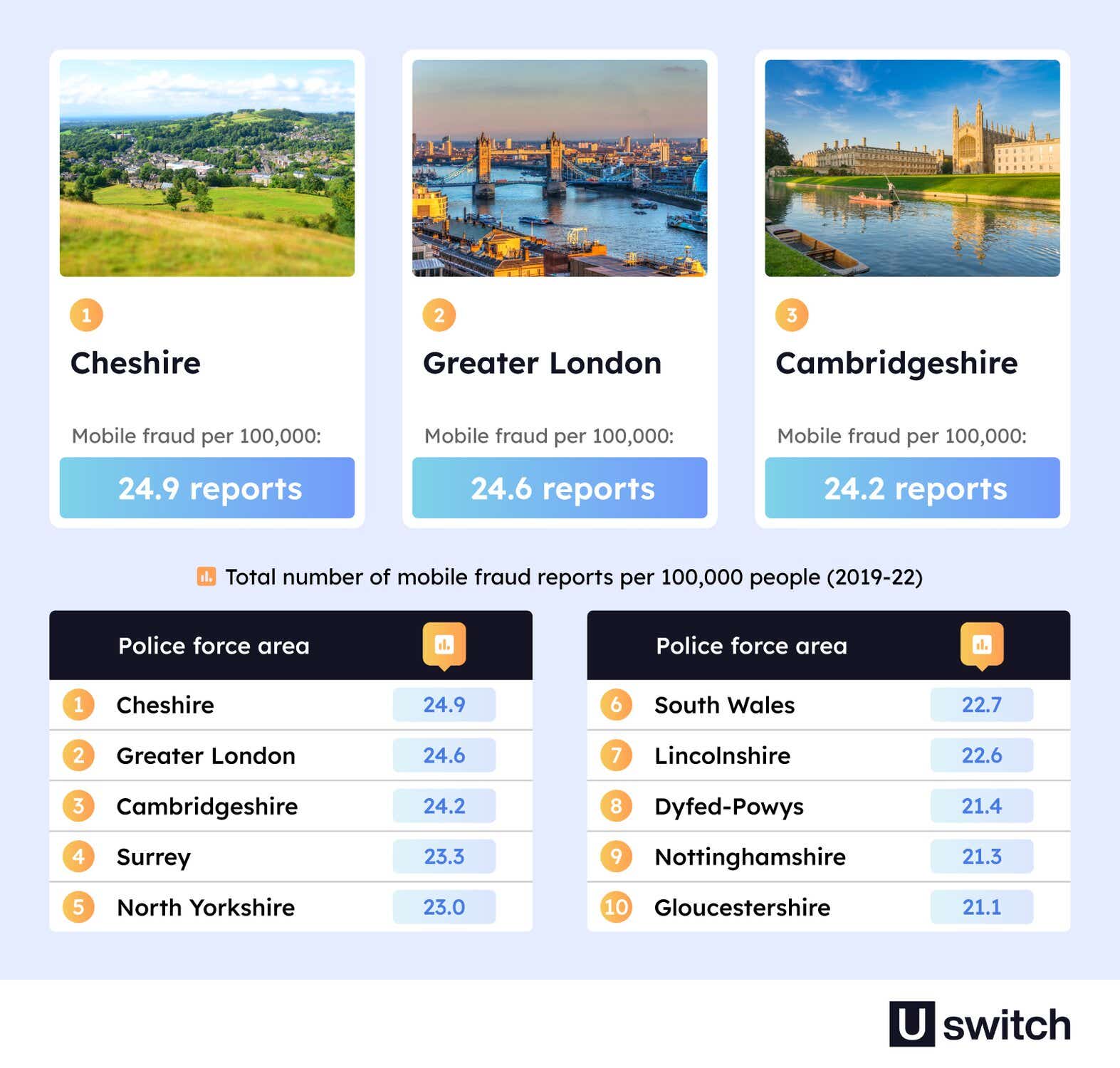
1. Cheshire | 24.9 reports of mobile fraud per 100,000
Cheshire is the UK’s mobile phone scam hotspot. Between 2019 and 2022 there were 24.9 reports of mobile fraud made to the Cheshire Constabulary per 100,000 people.
2. Greater London | 24.6 reports of mobile fraud per 100,000
London is the second most affected UK area for mobile fraud. There were 24.6 reports of mobile fraud made to the Metropolitan Police per 100,000 people in the last three years.
3. Cambridgeshire | 24.2 reports of mobile fraud per 100,000
Cambridgeshire Constabulary received more mobile scam reports than most other UK police forces from 2019-2022. There were 24.2 reports of consumer phone fraud per 100,000 people.
When are you most likely to be affected by mobile phone scams?
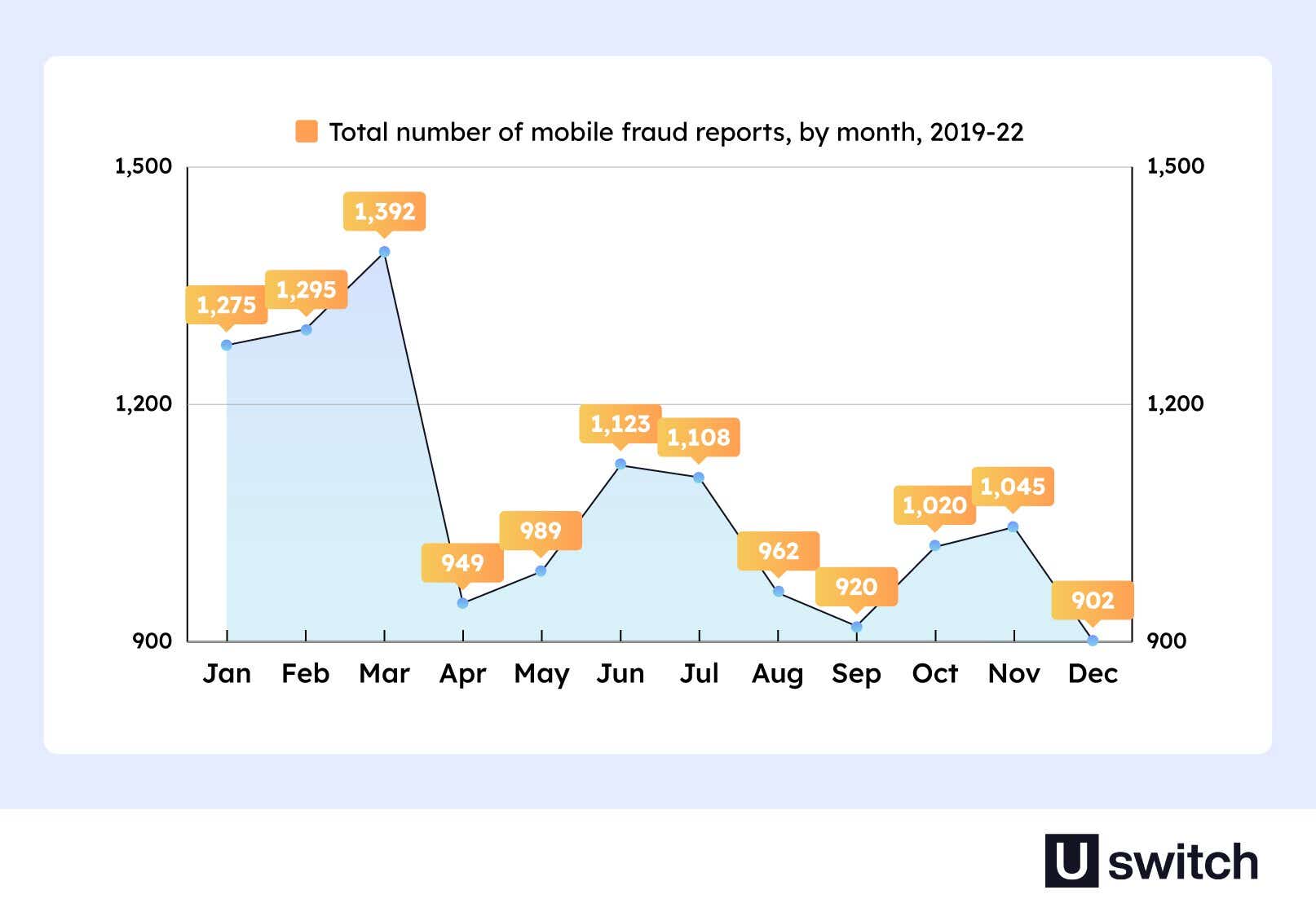
Brits are most susceptible to mobile fraud following the festive season. There were 3,962 reports of mobile scams between January and March 2019-2022. During this time, cybercriminals might impersonate holiday companies, targeting parents ahead of the February half-term. Romance scams can also be common during this time of the year, with criminals asking for money or personal information ahead of Valentine’s Day.
Comparatively, there were 2,967 reports of mobile fraud made during the run-up to the holiday season, between October and December every year since 2019. It can be common for cyber thieves to carry out scams during this period, posing as delivery services and gift card suppliers.
There is also a spike in mobile fraud reports during the summer. There were 3,193 reports made to Action Fraud between June and August 2019-2022. Fake holiday and events scams can affect parents with children during the summer holidays.
How to protect yourself from mobile phone scams
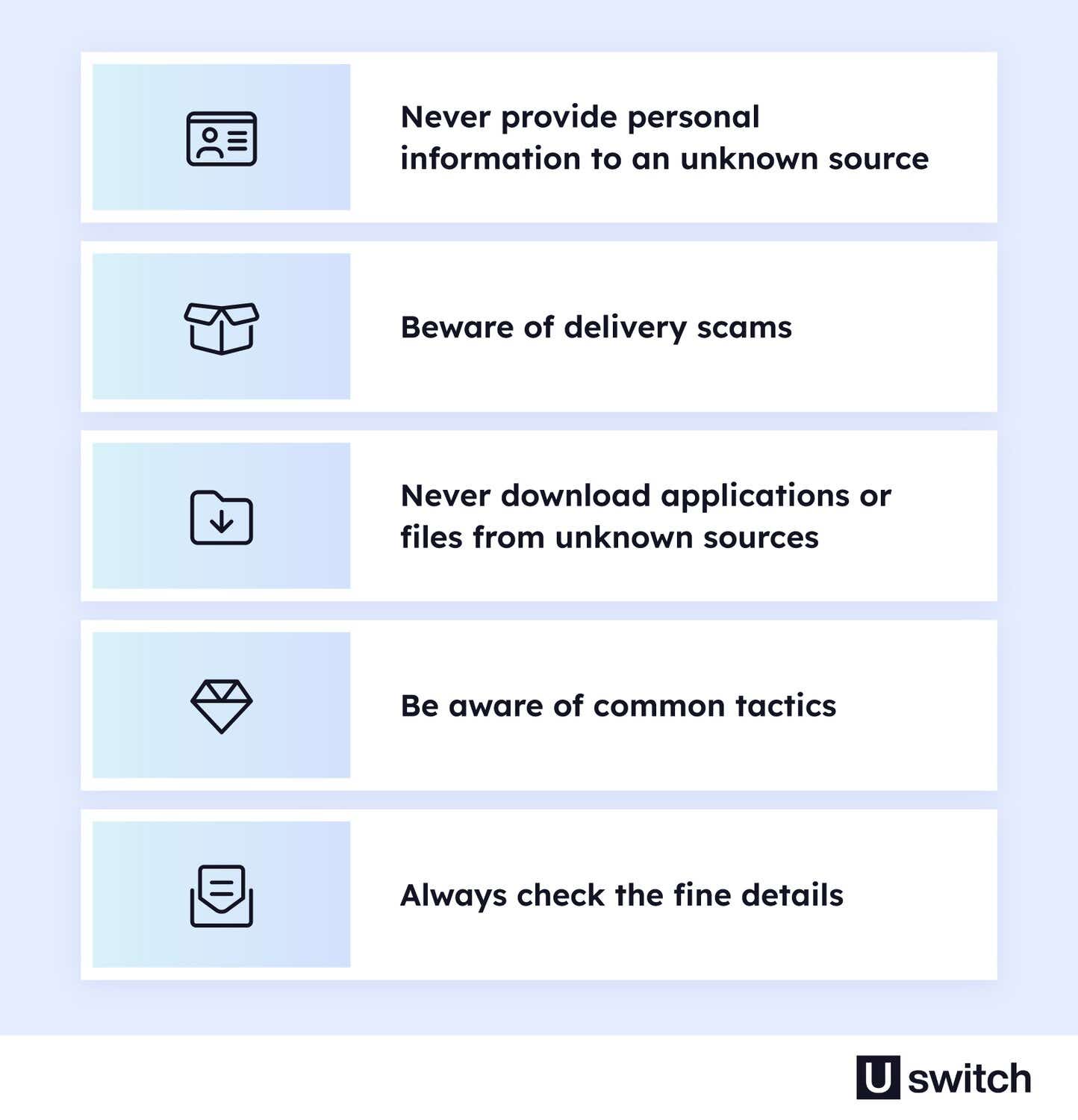
Anyone can fall victim to mobile phone scams, therefore it is important to know how to reduce your risk of being targeted by criminals. Some steps you can take to protect yourself are:
1. Never provide personal information to an unknown source
Romance and confidence scams are among today's most common mobile phone fraud scams. Criminals may use Whatsapp or Instagram to pose as a family member or friend and ask for money. In some instances, scammers might use generic terms like ‘Mum’, ‘Dad’ or ‘friend’ to refer to the victim. If you find yourself suspicious that you are being targeted by a confidence scammer, always call the person you are texting to verify their identity before sending money.
2. Beware of delivery scams
Common delivery scams involve criminals impersonating services such as Amazon and Royal Mail. The scammer often asks you to reschedule a missed delivery or asks you to pay customs charges on a package. Text messages impersonating legitimate companies often include links and urge you to act quickly. This is a common type of smishing scam, and it is essential to report scam numbers when you receive suspicious texts.
3. Never download applications or files from unknown sources
If you visit a website through your phone or tablet and are prompted to download software or a file, you should always decline. You should also be wary of any automatic pop-up windows opened on your phone or tablet and close any suspicious windows that you encounter. It is always a good idea to only download apps or files from trusted, known sources, such as the Google Play Store and Apple App Store.
4. Be aware of common tactics
Scammers often use the same tactics to try to get money from you. This usually involves playing on your emotions. For example, if the person you are communicating with pressures you with urgency or threats, makes you feel guilty or offers grand rewards in exchange for something, you are likely being scammed.
5. Always check the fine details
Scam texts will often come from an unknown number. Before responding to any unknown number that claims to be an official institution, try Googling their phone number first to see if it is a legitimate number. Scam texts will also often include poor grammar and spelling mistakes, which is a telltale sign of a scam.
Under-reporting of mobile phone scams
While Action Fraud provides the most accurate representation of the state of mobile fraud in the UK, the data represents a fraction of all cyber fraud offences. Action Fraud data is self-reported, therefore relies on victims of cyber fraud to report mobile fraud crimes.
Due to the nature of many forms of mobile fraud, including romance scams and WhatsApp relative scams, many victims may feel embarrassment, anxiety or fear which prevents them from reporting these crimes.
Action Fraud data regarding mobile fraud in Scotland may also lack accuracy since Police Scotland is the primary reporting body for fraudulent activity affecting Scottish victims. Police Scotland holds no formal agreement to report to Action Fraud.
FAQs
How to block scam calls UK
Scam calls can cause a great amount of stress, anxiety and fear for many. Often, your phone provider can help apply a scam call shield to your phone number and prevent you from receiving calls from suspicious numbers.
For landline phones, you can purchase a call blocker, which is a device that can be easily attached to your phone. A call blocker can block unknown numbers or ask callers to identify themselves before the call is connected to you.
How to avoid mobile phone scams
The best way to avoid becoming a victim of phone scams is to stay vigilant and protect yourself. Scammers can target anyone, regardless of age or location. You should be aware of smishing and vishing scams.
You should also be suspicious of anyone pushing you to transfer money or provide personal information urgently, even if the message appears to come from someone you know. Remember that a loved one or trusted company would never make you feel uncomfortable or rush you to make an important decision.
How to block scam pop-ups
Many browser apps allow you to block pop-up windows. In the settings menu of your chosen browser app, you will likely be able to block or disable pop-ups. You should also manage your website subscriptions to ensure that you are not unknowingly subscribed to receive pop-up notifications from a site.
Methodology and sources
All information on the number of mobile fraud reports by year, month, age and police force area was obtained from Action Fraud. When referring to mobile fraud, this included reports of scams which fell under the crime code NFIB3B: Consumer Phone Fraud.
All information on the population of the UK by age group was sourced from the Office for National Statistics: Estimates of the population for the UK, England, Wales, Scotland and Northern Ireland Mid-2021 edition. For the Isle of Man, police force population figures were unavailable therefore this was removed from the report. The City of London was removed due to having a significantly lower population, which skewed the results.
Information on the population of each police force area was sourced from the Office for National Statistics: Crime in England and Wales: year ending September 2022.
Information on cyber fraud in England and Wales was sourced from the Office for National Statistics: Nature of crime: fraud and computer misuse, year ending March 2022.
Information on the prevalence of fraud in England and Wales was sourced from the Office for National Statistics: Crime in England and Wales: year ending September 2022.
Figure 2 - The likelihood of being a victim of crime varies by crime type.
All figures were rounded to the nearest whole number.



